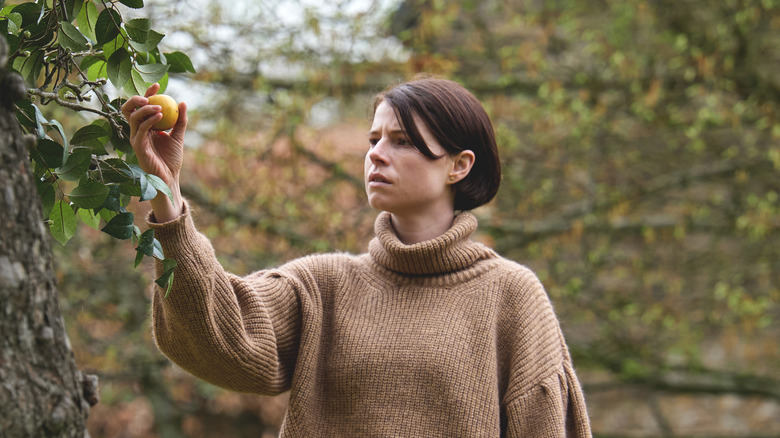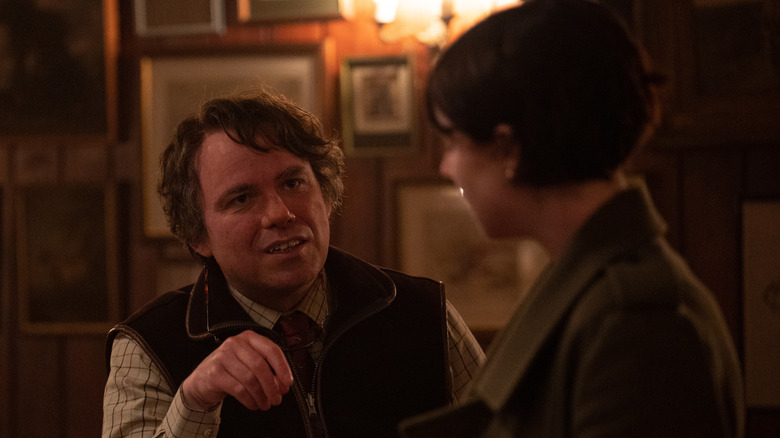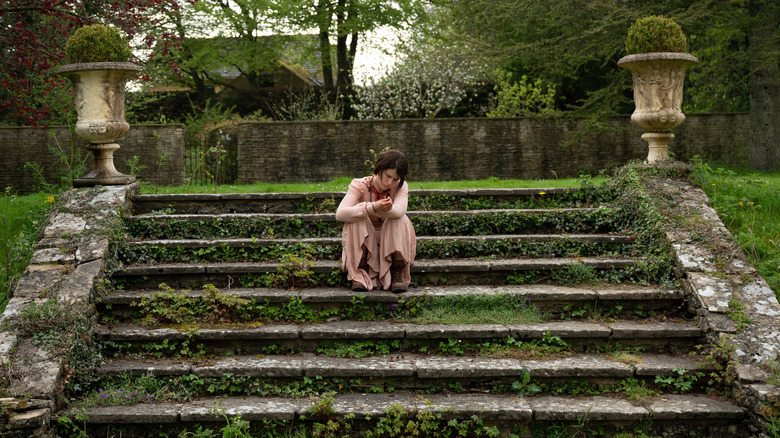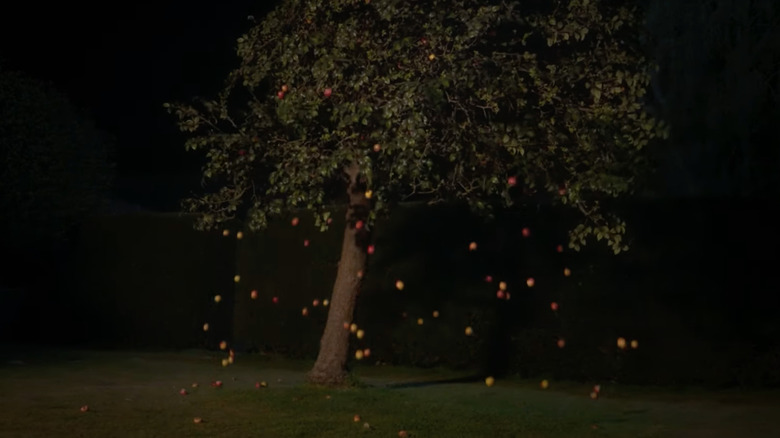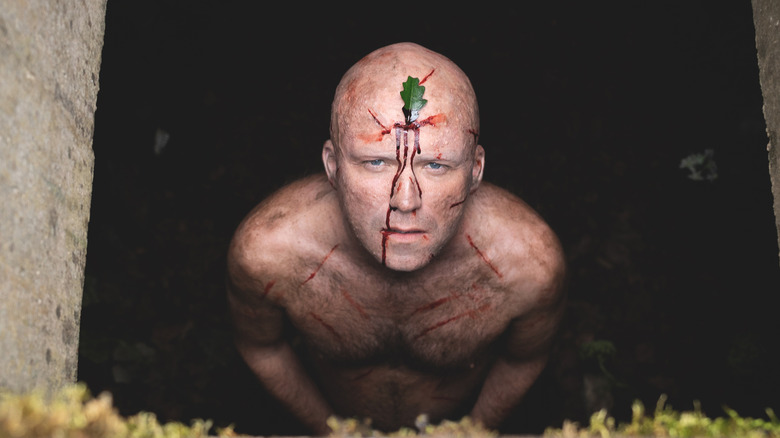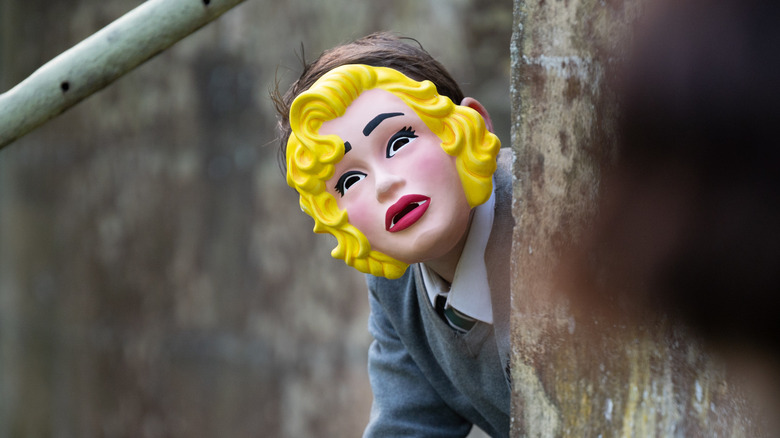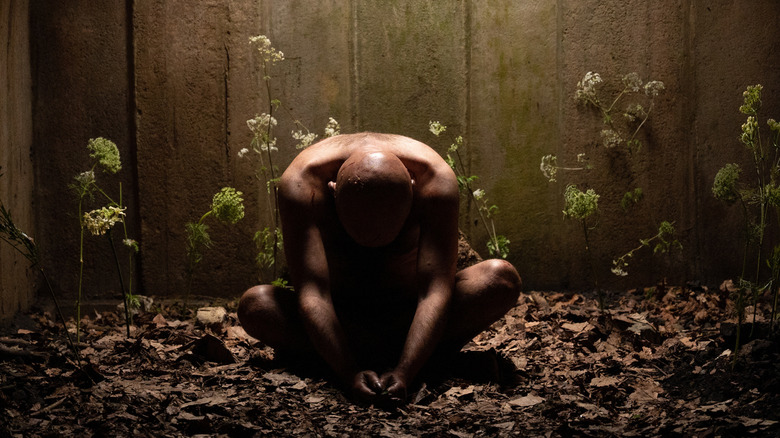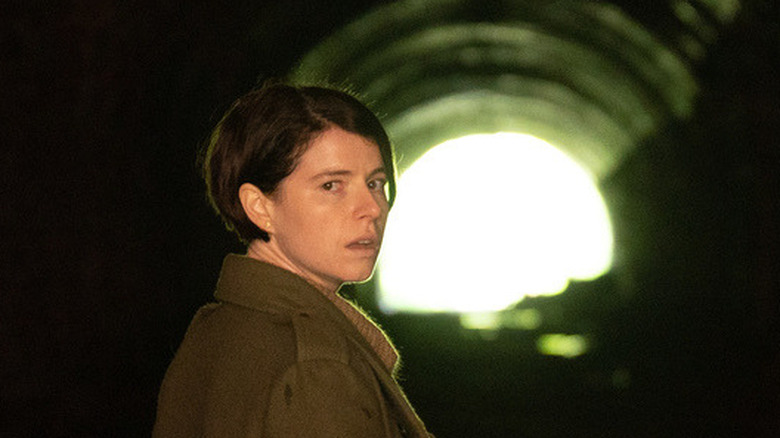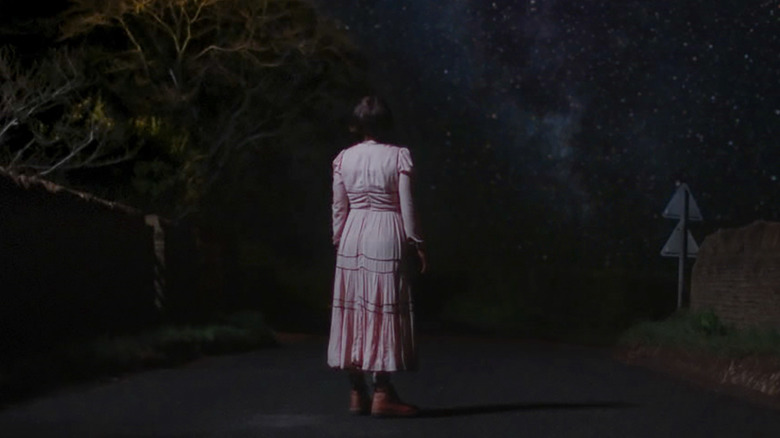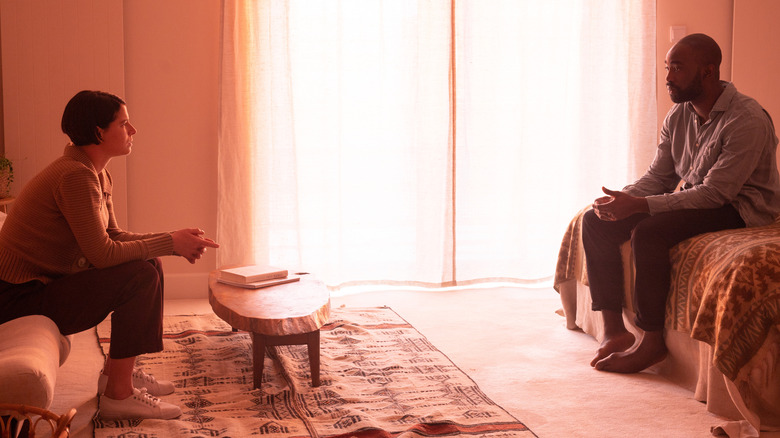The Ending Of Men Explained
There have been many horror and slasher films about the evil that men do, particularly to women. "Psycho," "Halloween," and "Friday the 13th" all feature broken and dysfunctional men taking their pain and anger out on any poor and unwitting females who happen to cross their paths. In A24's "Men," director Alex Garland ("Ex Machina," "Annihilation") chooses to do things a bit differently. His film about the all-encompassing power of the patriarchy doesn't just feature one misogynistic male; it incorporates an entire cast of them — all of whom boast unique and insidious ways to make a lady's life hell. From the sensitive husband to the caring priest, cheeky schoolboy, and jovial landlord, no male figure in "Men" is what they seem.
Scratch away its haunting imagery and layered ambiguity, and "Men" is simply a film about sexism and the constructs and deceits men and society use to justify it. Yet "Men's" true power lies in the suggestion that misogyny is not a relatively modern construct born out of Western culture, but more a horror that is as ancient as its seemingly endless. The claustrophobic cauldron of male rage, accusation, and resentment that the character of Harper finds herself trapped in simmers slowly until it boils over in an ending that is gruesome and thought-provoking. There are layers of meaning, particularly surrounding the ending, so let's take a deep dive.
What you need to remember about the plot of Men
"Men" begins with Harper Marlowe (Jessie Buckley), who's looking to find a quiet place in the English countryside to recoup and recover after the suicide of her husband James Marlowe (Paapa Essiedu). Through flashbacks, we later learn that James was an abusive partner who threatened to kill himself because Harper wanted a divorce. After making good on his promise, a haunted Harper strives to make sense of her late husband's behavior and find some sort of salvation in her own company and the natural world. The men in the village of Coston, Herefordshire have other ideas.
The owner of her holiday house, Geoffrey (Rory Kinnear) is the first male in the village that Harper encounters. He appears affable and helpful enough, but at times the eccentric and upper-class landlord lets slip a deeply rooted chauvinistic attitude. He appears to view women as clueless troublemakers who need a man to keep them in line. After Geoffrey things get a lot worse. First Harper's solitary walk is ruined by a naked, bald man who follows her home and terrorizes her. Then, she's called a b***h by a young boy in a weird rubber doll mask. Later, a priest scolds her for being responsible for James's death. Lost in a world of toxic masculinity, where even the local pub is full of hard stares and stony silences, Harper flees to the sanctity of her home where the final horror awaits.
What happened at the end of Men?
It's a staple of the horror genre that the preconceived safety of the home, always turns out to be a trap where the monster's fun can well and truly begin. The ending of "Men" is no different. When the bald, naked guy turns up at Harper's home looking like a pagan god of pillage and rape, the viewer knows things have crossed the Rubicon and fast. Yet not many in the audience would predict the surreal and disturbing nature of what comes next. As the bald, naked dude lies down, seemingly in his death throes, he suddenly grows a vagina, and out crawls another character from the film, perfectly formed and fully grown. The scene is horrific enough, but because all of the men in the movie are played by Rory Kinnear the scene has a slightly incestuous feel to it.
There is a cold and rigid logic to the birthing process that is extremely unnerving. Each man is slightly more damaged and feeble than his predecessor as they forsake the vagina to crawl out of any available orifice, such as the mouth. The final product of all this messy madness is Harper's husband James. By this point, Harper is numb to this gross caricature of childbirth. She sits down with James and asks him what it is he wants. To which her needy and self-absorbed late husband replies, "Your love." The scene then switches to Harper smiling as she sits alone on the lawn outside the house as her pregnant friend Riley arrives.
What is the symbolism of the apple tree?
When Harper first arrives at her holiday home in the sleepy village of Cotson, one of the first things she does is pluck an apple from the tree and bite into it. The camera lingers on her as she happily munches on the fruit in the quaint English country garden. Your name doesn't have to be Sherlock Holmes to realize there's some basic religious symbolism going on here. In the Bible, Eve is said to be the first woman, wife, and mother. She is hailed as the "Mother of All the Living," but gets an extremely raw deal for being the original female and is historically blamed for the fall of humanity.
The story goes that as a weak-willed and dizzy female, Eve was no match for Satan who appeared in the guise of a serpent and tempted her to eat the forbidden fruit from the tree of knowledge. God had forbidden both Adam and Eve to eat apples from the trees. To punish her disobedience, he kicked them both out of the Garden of Eden and insisted from there that it was a wife's duty to obey her husband in all things. When Harper bites into the apple, it's a reminder that women have long been held accountable for the majority of men's woes. As Geoffrey half-jokingly reminds Harper, "Scrumping, eh? No, no, no, no. Mustn't do that. Forbidden fruit." The sudden fall of all the apples could be a symbolic reminder of the inexorable fall of man, and the sheer number of women held responsible for it.
Who does the naked bald man represent?
The naked bald dude in "Men" is a strange one. He doesn't speak, has no reservations about his nudity, and has a habit of loitering with intent. When the police catch up with him in Harper's garden, they dismiss him as a common type of stalker whose mental health problems make him more of a threat to himself than others. Directly before encountering the bald man, Harper seems to find refuge in the arms of mother nature when she goes for a walk in a gentle storm. Yet it all goes to hell in a handcart when the naked guy appears.
In the context of the film, this man appears to represent the Green Man, as Alex Garland himself attests (via LA Times). The Green Man is a pagan deity whose likeness appears bizarrely in the stone carvings and sculptures within many European churches. The Green Man represents primal masculinity as old as the hills. He is often considered the symbol of rebirth and renewal, which is odd for such an uncompromising male figure. His presence in "Men" appears to suggest that the male's desire to dominate and subjugate the female is a war that has been raging for eons. In the church scene in "Men," there is also a sheela na gig carving. The Green Man is nearly always rendered by his facial likeness alone, but the carvings of sheela na gig, with their graphic and exaggerated vulva, define women purely by their sexuality. In the context of the film, it's a striking contrast.
Why are all the male parts played by Rory Kinnear?
Although they're a distinct bunch, all the males in "Men," except for Harper's husband, bear an uncanny resemblance to one another, and it's not just a result of their shared misogyny. They are all played with verve and vigor by Rory Kinnear. Was this Alex Garland's attempt to keep the film's budget manageable or is it a key part of the bigger picture? One of the prominent themes of "Men" is how toxic masculinity has a habit of perpetuating itself like a virus. It eats away at an individual, shutting minds, hardening hearts, fortifying prejudice, and making a virtue of weakness and hate.
Misogyny is corrosive to everyone it touches, especially those who do its bidding. Once it has stripped away everything that makes an individual human and unique, it leaves them an empty shell defined by bitterness and loathing. In giving all the males in "Men" the same face, Garland is reinforcing the notion that it's not just individuals who are to blame for the psychological, verbal, and physical abuse of women. It's our collective acceptance of it on a subconscious level that is the real culprit. It's interesting to note that Harper does not appear to acknowledge or realize that all the males in "Men" share the same face. Either she always perceives males as identical, or she remains unaware of the common bond that unites them until the film's end.
What the end of Men means
As each man gives birth to a more pathetic version of himself at the end of "Men," the symbolism is unmissable. Misogynistic males are part of an endless cycle of toxic masculinity that preys on confused, uncertain, and impressionable boys and turn them into broken men. The naked bald guy, who initiates the grotesque carnival of birth, has a cut hand and bust-up ankle that represents what happens to James when he throws himself out of the window. James is the archetypal modern man who believes he has risen above the sexism of old, but when his wife threatens to leave him, he hits her. In his mind, this proves how much he loves her, but in reality, it shows his frustration and shame at not being able to control that which he has always been taught is his.
The birthing scene begins with a pagan god and ends with James, who is the final face of a misogyny that now hides in accusation and self-pity rather than revealing itself in fists and fury. The abuser always blames the victim. When James arrives on the scene, his eyes are not full of remorse and regret but accusation and hurt. Harper faces her dead husband with a weary resignation and understanding that he is just another lost little boy diminished by father figures and role models who exploited his need to fit in and belong. The arrival of Harper's pregnant friend Riley in the final scene suggests the hope of finally breaking the chains of destructive patterns of behavior.
Is Men real or a result of Harper's PTSD?
The scene where Harper walks through a disused railway tunnel is a turning point in "Men." As well as being symbolic of the industry and the toil of men being slowly reabsorbed back into Mother Nature, the tunnel leads from one reality to another through a place of disorientating darkness. It's in the tunnel that Harper plays with her echo, as if getting back in touch with her fundamental self. It's also in the tunnel that Harper catches a glimpse of a threatening male figure who runs towards her. After this point, is every other male figure in "Men" a construct of Harper's PTSD?
As Harper walks through the tunnel, it is almost a metaphor for her journey back to happiness. Before she can make it to the other side, her exit is blocked by a menacing man who appears out of nowhere. The appearance of this unknown male appears to send Harper back into a state of panic and shock. Is she fleeing from an actual threat or is she haunted by the negative male energy in her life that manifests itself in all sorts of disturbing and weird ways? Unfolding events get progressively more surreal as Harper encounters a series of dysfunctional males until her final confrontation with the ghost of James. It's possible the entire movie is Harper's mind trying to make sense of her torment at the hands of one terribly toxic male.
What Alex Garland said about the ending
The ambiguity and nuanced nature of "Men" mean its ending could be discussed endlessly. That's just the way director Alex Garland likes it. In an interview with Polygon, Garland explained that he believed the film and its ending will be interpreted differently depending on what personal baggage each viewer brings to the table. Garland explained, "Many, many times, I've encountered people who say, 'This film is clearly this.' And what they really mean is, 'It's clearly this to me.' And that ends up being about them as much as it is about the film. It is about their response to it. It's about their life history, it's about their concerns about the world and their interaction with it."
In the same interview, Garland refers to his debut novel, "The Beach," which was later turned into a movie directed by Danny Boyle and featuring Leonardo DiCaprio. He explained he intended it as a story that criticized the backpacker scene, but many people interpreted it as a celebration. However, Garland is quick to point out that a movie's creator is no more an authority than a member of the audience when it comes to what it means or how its ending can be interpreted. The beauty of "Men" — and all other films whose endings and themes are open to interpretation — is that it constantly engages the viewer and encourages them to actively participate in its continual creation.
Men's alternate ending
When the gross caricature of childbirth finally ends, James sits with a weary Harper who asks what exactly he wants from her. He replies that he craves her love. It's a classic abuser's trick to turn the tables and shift the blame. However, the viewer is left uncertain if Harper kills James or simply walks away because she no longer sees him as a threat but rather as the last in a long line of men who couldn't break free from self-destructive patterns of behavior. Sitting down with the man-child, who is as pathetic, self-absorbed, and needy as ever, diffuses him as a menace in Harper's eyes. As she grows ever more secure in her womanhood, she is finally free from his shadow. It would seem unlikely in such a situation that Harper would feel the need to kill James when she can just walk away.
In the final scene, Harper is reunited with her pregnant friend Riley. Garland revealed to Polygon that in the final cut, there were a few lines of extra dialogue between Harper and Riley, but he binned them in favor of the more ambiguous ending that a simple smile suggests. Garland explained in a New York Q&A, "I'm always looking to cut dialogue. I personally found it more touching when they just smiled at each other, because it's been so dreadful, what preceded that moment. And all they have to do is smile at each other, and that felt stronger and simple. The dialogue felt redundant next to the smile."
